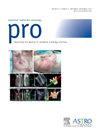Impact of the ASTRO 2024 Guideline on Partial Breast Irradiation Eligibility in Breast Cancer Patients (KROG 24-01)
IF 3.5
3区 医学
Q2 ONCOLOGY
引用次数: 0
Abstract
Purpose
The American Society for Radiation Oncology (ASTRO) has recently published new guidelines for the eligibility for partial breast irradiation (PBI). This study aims to evaluate the eligibility rates of PBI according to the ASTRO 2017 and 2024 guidelines.
Methods and Materials
Patients diagnosed with pTis-T2N0 breast cancer in 2019 from 3 tertiary medical centers were accrued. All patients received standard treatment consisting of breast-conserving surgery followed by radiation therapy. Subsequently, patients were classified according to the ASTRO 2017 and 2024 guidelines.
Results
For invasive breast cancer, 785 patients were included, among whom 192 received PBI. Classification according to the ASTRO guidelines showed a substantial increase in the proportion of patients eligible for PBI: 19.2% were classified as “suitable” under the ASTRO 2017 guidelines, while 42.4% were classified as “strongly recommended” under the ASTRO 2024 guidelines. Among 286 patients diagnosed with ductal carcinoma in situ (DCIS), 50 (17.5%) received PBI. The proportion of PBI-eligible patients nearly doubled, from 27.3% under the ASTRO 2017 guidelines to 51.7% under the ASTRO 2024 guidelines. The expanded age criterion from 50 to 40 years and the removal of the clear resection margin requirement were key factors contributing to this substantial increase in both invasive breast cancer and DCIS.
Conclusions
The eligibility for PBI has dramatically increased for both invasive breast cancer and DCIS under the ASTRO 2024 guidelines. These findings suggest a potential for increased use of PBI, offering individualized and optimized treatment options in early breast cancer.
ASTRO 2024指南对乳腺癌患者部分乳房照射资格的影响(KROG 24-01):ASTRO指南规定的部分乳腺照射资格。
背景:美国放射肿瘤学会(ASTRO)最近发布了新的乳腺部分照射(PBI)资格指南。本研究旨在根据ASTRO 2017年和2024年指南评估PBI的合格率:收集了来自三个三级医疗中心的2019年诊断为pTis-T2N0乳腺癌的患者。所有患者均接受了标准治疗,包括保乳手术和放疗。随后,根据ASTRO 2017和2024指南对患者进行分类:结果:共有785名浸润性乳腺癌患者接受了PBI治疗,其中192人接受了PBI治疗。根据ASTRO指南进行的分类显示,符合PBI条件的患者比例大幅增加:根据ASTRO 2017指南,19.2%的患者被归类为 "适合",而根据ASTRO 2024指南,42.4%的患者被归类为 "强烈推荐"。在确诊为导管原位癌(DCIS)的286名患者中,有50人(17.5%)接受了PBI治疗。符合PBI条件的患者比例几乎翻了一番,从ASTRO 2017指南中的27.3%增至ASTRO 2024指南中的51.7%。年龄标准从50岁扩大到40岁以及取消了明确切除边缘的要求是导致浸润性乳腺癌和DCIS患者比例大幅增加的关键因素:结论:根据 ASTRO 2024 指南,浸润性乳腺癌和 DCIS 的 PBI 资格大幅提高。这些研究结果表明,PBI 的使用有可能增加,从而为早期乳腺癌提供个体化的优化治疗方案。
本文章由计算机程序翻译,如有差异,请以英文原文为准。
求助全文
约1分钟内获得全文
求助全文
来源期刊

Practical Radiation Oncology
Medicine-Radiology, Nuclear Medicine and Imaging
CiteScore
5.20
自引率
6.10%
发文量
177
审稿时长
34 days
期刊介绍:
The overarching mission of Practical Radiation Oncology is to improve the quality of radiation oncology practice. PRO''s purpose is to document the state of current practice, providing background for those in training and continuing education for practitioners, through discussion and illustration of new techniques, evaluation of current practices, and publication of case reports. PRO strives to provide its readers content that emphasizes knowledge "with a purpose." The content of PRO includes:
Original articles focusing on patient safety, quality measurement, or quality improvement initiatives
Original articles focusing on imaging, contouring, target delineation, simulation, treatment planning, immobilization, organ motion, and other practical issues
ASTRO guidelines, position papers, and consensus statements
Essays that highlight enriching personal experiences in caring for cancer patients and their families.
 求助内容:
求助内容: 应助结果提醒方式:
应助结果提醒方式:


